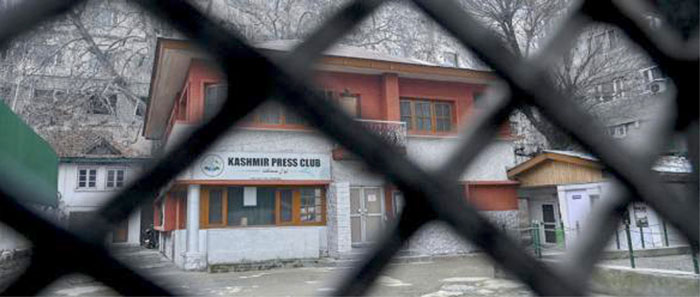Paris-based Reporters Without Borders (RSF) has demanded the immediate reopening of the Kashmir Press Club, closed after invaded by agents of the New Delhi-run local regime and Indian paramilitaries last week.
The Reporters Without Borders (RSF) in a statement posted on its official website said that Kashmiri journalists used the club to discuss their problems and defend press freedom.
Located in Srinagar, the Kashmir Press Club (KPC) was formally dissolved on 17 January by local government representatives, who had taken possession of its premises and rescinded the licence of what was the region’s important journalists’ organisation.
It was the last stage in a coup that began in 14 January, when officials announced the suspension of the KPC’s registration. The next day, on 15 January, the building that houses the club was overrun by members of the region’s paramilitary forces, who claimed that they were enforcing Covid-19 measures, the statement added.
“There were accompanied by three pro-government media representatives, Saleem Pandit, Zulfiqar Majid and Arshid Rasoolm, who declared themselves to be the KPC’s new administrators. Its doors were then sealed and journalists were denied entry.”
“We call on Jammu and Kashmir Lieutenant Governor Manoj Sinha to immediately restore the KPC’s licence and order its reopening,” said Daniel Bastard, the head of RSF’s Asia-Pacific Desk. “This society’s closure is clearly the outcome of a coup hatched at great length by the local government, which follows Prime Minister Narendra Modi’s orders. This undeclared coup is an Indian government insult to all the journalists trying to do their job in the Kashmir Valley, which is steadily being transformed into a black hole for news and information.”
The grounds given by those who took possession of the club’s premises was its failure to hold the internal elections that were originally supposed to have taken place on 19 July 2021. But, in reality, it was the Jammu and Kashmir administration that blocked the process by delaying the club’s re-registration as a society, a formal pre-requisite. As the KPC’s outgoing president, Shuja ul-Haq, pointed out in a statement, the club submitted its request in May 2021 but did not receive a reply until 29 December.
On 13 January, the KPC bureau finally welcomed the “smooth running of the club re-registration process under the Societies Act 1860” and said it would therefore be possible to hold the internal elections in February. It was the next day that the authorities announced the suspension of its registration and two days later that the paramilitaries forced their way into the club in order to take possession.
KPC general secretary Ishfaq Tantray, told RSF: “The elected body respected and honoured the mandate journalists gave to it. We have worked professionally and with integrity. The best and the positive course ahead is to restore the club and its premises to the journalists and allow the elected body to organise elections as soon as possible. Anyone who wants welfare and good for journalists should vouch for this outcome. Let better sense prevail on all sides.”
Author and journalist Gohar Geelani has no illusions about what occurred. “The coup took place in the presence of government forces personnel, which tells us about the credibility of those who orchestrated the move,” he told RSF. “This is one of the most ferocious attacks on free media in Kashmir. The administration has made it clear that it wants pliant stenographers, not independent media.”
The club’s closure has traumatised the Kashmiri journalistic community. “As an independent journalist, it feels as though I have been evicted from my home,” freelancer Aakash Hassan told RSF. “The press club provided us with shelter, a place where we could sit and work even in the most difficult situations.”
The reasons for closing the KPC are clear, Hassan said. “The club was a distinct institution protecting journalist rights in the region, where attacks on the media and intimidation of journalists by the authorities are reaching unprecedented levels. Stopping people from having a space like the KPC was simply to bring an end to any solidarity that emerges in difficult times for journalists in Kashmir.”
The latest example was reporter Sajad Gul’s arrest by Indian paramilitaries on the evening of 5 January for nothing more than posting a video on Twitter. He is still being held although a court ordered his release on bail on 16 January. The press club publicly called for his release on 11 January.
Press freedom violations have surged in Jammu and Kashmir ever since the Indian authorities rescinded the region’s autonomy in August 2019, to the point of turning it into a new information black hole.—KMS










